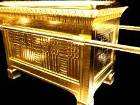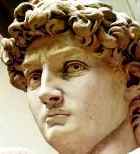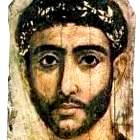Nathan and David in the Bible
How do you get a powerful leader to do the right thing? Nathan in the Bible knew how. A clever diplomat and a wise friend, he steered King David out of trouble.
Who was Nathan?
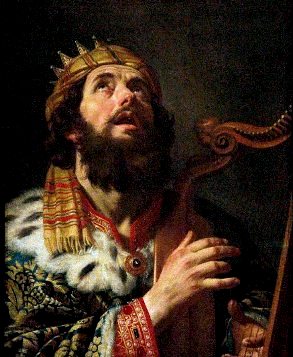
Nathan was King David’s mentor. He advised David, even scolded him, when others did not dare. How did he do it? Nathan had great tact, and David trusted him.
In one instance, David worried that his own house/palace was more luxurious than God’s – ie, the Ark of the Covenant.
In fact, David’s house was probably a fairly simple stone structure in a fortified position. And God’s ‘house’, the Ark of the Covenant, was no house at all, but a portable shrine sheltered from the elements by a woven tent.
Nevertheless David told Nathan, his confidante and adviser, of his concerns. Bible reference: 2 Samuel 7
What was Nathan’s dream?
The conversation must have played on Nathan’s mind, because that night he dreamt about the matter. In his dream, God instructed him to give a message to David.
It was not the message that David expected. In fact, it turned David’s initial idea on its head.
God, said Nathan, saw the word ‘house’ in quite a different way. The ‘house’ of God would not be a structure, however lavish, but a dynasty with God at its head.
In the days of the Patriarchs the head of the clan had walked at the front of his tribe, leading the way and showing his people where they were to go.
In just such a way, God would lead this house, David’s, even when its members wanted to go in a different direction, or go off course completely. God might chastise them for their sins, but he would stay with them through to the end.
So the first time we meet Nathan, he is acting as God’s messenger, God’s voice: it was a position of enormous power.
David, Bathsheba, Uriah – a murder
The next part of Nathan’s story follows immediately after King David’s seduction of Bathsheba, and his murder of her husband, Uriah (read about this at Bathsheba’s story).
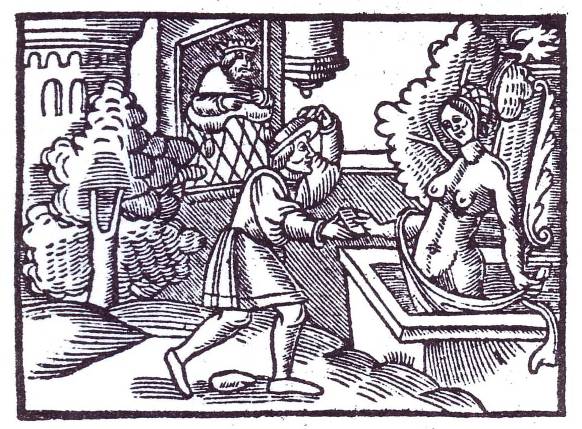
David invites Bathsheba to the palace, illustration from a 16th century English Bible. King David, in the background, bears a remarkable resemblance to King Henry VIII
‘David has now sunk to or even below the level of his subordinates in earlier narratives: as king, he has become, in the end, the outlaw he once represented without incurring guilt. He has murdered not an enemy, nor even a former enemy, but a loyal and upstanding subordinate. He has claimed that subordinate’s wife. Nor does the husband simply drop dead at a convenient moment, as Abigail’s husband had done earlier: David has usurped the role of Yahweh, by providing violently for himself.’ David’s Secret Demons, Baruch Halpern, p36.
 Everyone knew it was David who had ordered the murder of Uriah, and there seemed to be universal disgust at the deed. But what could they do about it?
Everyone knew it was David who had ordered the murder of Uriah, and there seemed to be universal disgust at the deed. But what could they do about it?
Someone in the court had to confront David for his own sake, and it was left to Nathan, David’s most trusted adviser, to do so.
Nathan, clever diplomat
But to accuse the king publicly, or even privately, would be dangerous. So Nathan told a story or parable about two men, one rich and one poor.
 The rich man had a guest in his house, and the laws of hospitality demanded that he entertain and feed his guest with the best he had. He looked around for a plump young lamb that could be killed and roasted. But instead of choosing one from his more than ample flocks, he took a female lamb belonging to the poor man. This, as it happens, was not just any lamb: it was a beloved pet of the family, as precious to them as any pet dog or cat might be to its owner today.
The rich man had a guest in his house, and the laws of hospitality demanded that he entertain and feed his guest with the best he had. He looked around for a plump young lamb that could be killed and roasted. But instead of choosing one from his more than ample flocks, he took a female lamb belonging to the poor man. This, as it happens, was not just any lamb: it was a beloved pet of the family, as precious to them as any pet dog or cat might be to its owner today.
David, when he heard the story, was outraged that the rich man should do such a callous thing, and demanded to have him brought before him. He deserved to die, said David.
 ‘You are the man!!’ said Nathan dramatically. He had trapped David into pronouncing a death sentence on himself.
‘You are the man!!’ said Nathan dramatically. He had trapped David into pronouncing a death sentence on himself.
Nathan proceeded to point out to David some home truths:
- David had usurped the role of Yahweh by taking the life of Uriah
- He had committed adultery and killed an innocent man
- He could not avoid punishment
- The child that Bathsheba carried would die, and someone close to David, a member of his own family, will have sexual intercourse with David’s own wives – this in fact happened when Absalom later rebelled and took over his father’s harem.
Nathan’s superb diplomacy had brought David to his senses.

‘You are the man!’, Angelika Kaufmann

Nathan accuses David of murdering Uriah, husband of Bathsheba

Nathan denounces David, James Tissot
Struggle for the throne 1 Kings 1:1-40
As King David grew older, his ability to rule his volatile kingdom declined.
A crisis occurred when he lost his sexual virility (read about this at Struggle for the Throne).
It was a more serious matter than it would be today. A king’s ability to perform the sexual act was believed to reflect his personal power, and the well-being of his kingdom. If David was impotent then it followed, so people thought, that his kingdom was weakened to the point of collapse.
Every effort was made to revive him. A beautiful young virgin was brought to his bed but he was unable to respond.
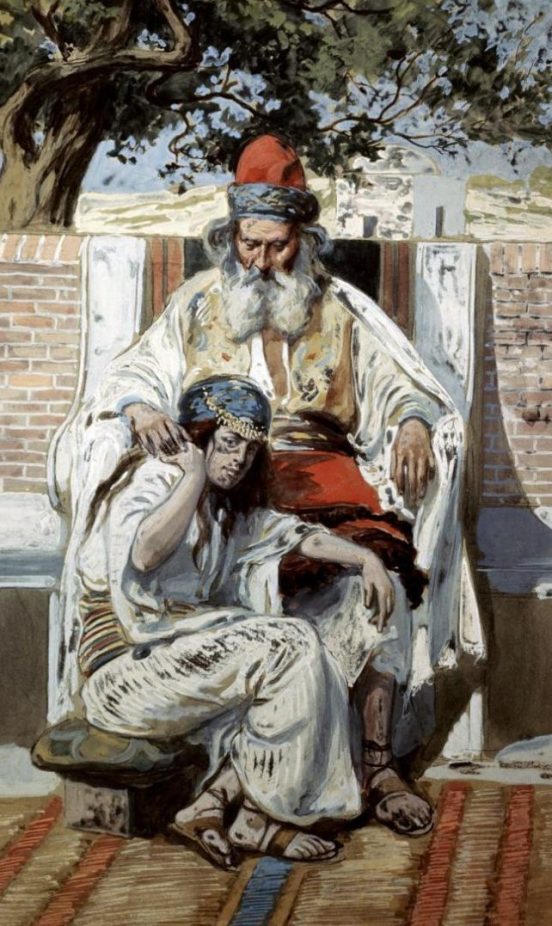
David & Abishag, by James Tissot
It was then that jockeying for the throne came out into the open.
David’s eldest surviving son, Adonijah, was the logical choice. He was popular with the people and supported by the tribal armies and their leaders. He had been publicly acclaimed as the next king.
Nathan helps Bathsheba, Solomon
But the clique led by Nathan and Bathsheba had other ideas. They wanted Bathsheba’s son Solomon to rule, and they engineered a successful palace coup.
If they had not done so, they would almost certainly have been killed in the general clean-up after Adonijah’s accession. Younger sons and their supporters were too dangerous, and a blood-bath usually followed the accession of a new king (see the story of the Bible’s ruthless arch-villainess Athalia).
Bathsheba begs David to name Solomon as his successor, David Goodall
Nathan and Bathsheba went to David in his bedroom. Whether they were invited to do so by David is a moot point. There were no other people in the room to witness the scene, or to tell what was said (despite the artist’s fantasy shown in the painting above).
Nathan’s palace coup
When Nathan and Bathsheba left David’s room, they told the courtiers that David had named Solomon as his successor. No-one was brave enough to contradict them.
- Why did Nathan take part in this scheme?
- Did he believe Solomon would make a better leader than Adonijah?
- Had he always been a supporter of Bathsheba, since the day years ago when he told the parable of the rich man, the poor man, and the lamb?
- Did he believe this was David’s choice for leader?
It is impossible to tell. The story was part of the royal records, written and handed down by someone in Solomon’s court, certainly not an impartial witness.
Perhaps it was Nathan himself who wrote the story.
© Copyright 2006
Elizabeth Fletcher

